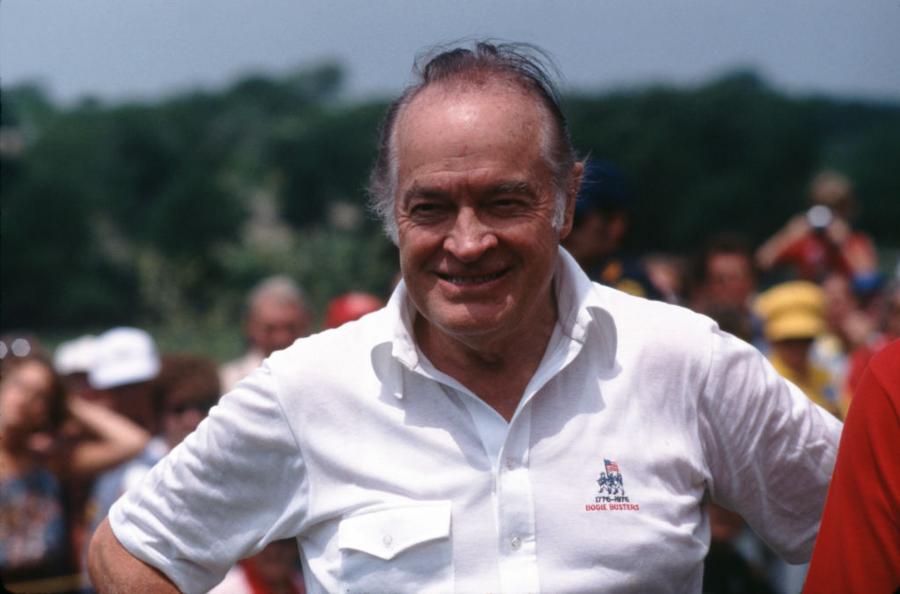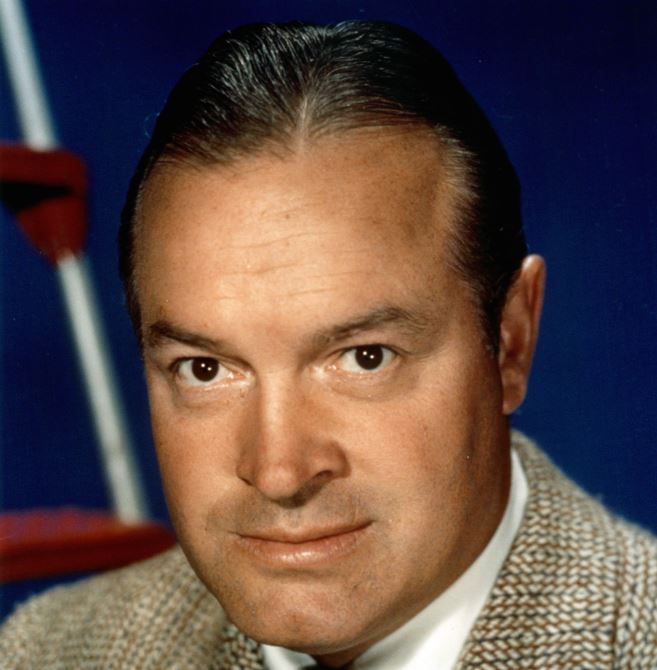What Was Bob Hope's Net Worth and Salary?
Bob Hope was a British-born American comedian, actor, singer, dancer, and author who had a net worth of $150 million at the time of his death in 2003. After adjusting for inflation, that's the same as around $250 million in today's dollars. Bob Hope appeared in over 70 short and feature films across his nearly 80-year career. He also hosted the Academy Awards a record 19 times, appeared on many television shows and in theatrical productions, and authored 14 books. Additionally, Hope achieved much recognition for the 57 tours he did for the United Service Organizations, entertaining American military personnel around the world from 1941 to 1991. Bob Hope died on July 27, 2003, at the age of 100.
Bob Hope's Wealth
At various points in his life, his net worth had been estimated to be as much as $700 million, mostly thanks to valuable real estate holdings in Southern California. In the early '80s, "Forbes" estimated his net worth at $200 million. When he heard about the estimate, Bob responded by saying:
"If my estate is worth over $50 million, I'll kiss your ass. I mean that."
This sent a reporter from "Forbes" on a mission to evaluate his estate to prove or disprove their $200 million original estimate. In the end, that reporter adjusted the magazine's estimate down to $85 million. Bob did not follow through on his promise to kiss a rear. At the time of his death in 2003, his estate was worth $115 – $150 million.

(Photo by Camerique/Getty Images)
Early Life and Career Beginnings
Bob Hope was born Leslie Townes Hope on May 29, 1903, in London, England. He was the fifth of seven sons. His English father, William, was a stonemason, while his Welsh mother, Avis, was an opera singer. When Hope was four, the family immigrated to the United States and settled in Cleveland, Ohio. As a kid, Bob earned money by singing, dancing, and performing comedy in public, and he also took part in many amateur talent contests. Following a brief boxing career in 1919, he worked as a butcher's assistant and a lineman and did a short stint with the Chandler Motor Car Company. When Hope decided on a career in show business, he signed up for dancing lessons along with his girlfriend. During a performance of his in 1925, Bob was noticed by silent film comedian Fatty Arbuckle, who subsequently found Hope work with a touring troupe. For his performances in the '20s, Bob gained renown as a comedian and dancer on the vaudeville circuit. In 1934, he began performing on the radio, and in 1937, had his first regular series with the "Woodbury Soap Hour" on NBC Radio.
Film Career
In the early '30s, Hope signed a contract with New York's Educational Pictures to star in six short films. He was not happy with the first film, "Going Spanish," and was consequently dropped by the studio. Bob later signed with Warner Brothers, and then moved to Hollywood and signed with Paramount Pictures. For Paramount, he starred alongside W. C. Fields in the musical "The Big Broadcast of 1938," which featured Hope's signature song, "Thanks for the Memory."
As a star of film, Bob became best known for his hugely successful "Road" movies, in which he starred opposite Bing Crosby and Dorothy Lamour. Seven "Road" films were made between 1940 and 1962: "Road to Singapore," "Road to Zanzibar," "Road to Morocco," "Road to Utopia," "Road to Rio," "Road to Bali," and "The Road to Hong Kong," released after an 11-year hiatus. Following the end of the series, Hope starred in such films as "Critic's Choice" with Lucille Ball and Rip Torn, "Call Me Bwana" with Anita Ekberg; "Eight on the Lam" with Phyllis Diller and Jonathan Winters, "Cancel My Reservation" with Eva Marie Saint and Ralph Bellamy, and "A Masterpiece of Murder."

Getty
Television Career
Starting in the '50s, when radio lost its popularity to television, Hope began doing numerous specials on the NBC television network. Among his most famous contributions were his annual Christmas specials, on which he performed favorite songs like "Silver Bells." In 1970 and 1971, Hope's Christmas specials were filmed in Vietnam in front of military audiences; both were seen by more than 60% of all US households watching television. Additionally, from 1939 to 1977, he hosted the Academy Awards ceremony 19 times, more than anyone else in history.
Later on, Bob made a guest appearance on the sitcom "The Golden Girls." In 1993, he was part of his 90th birthday television celebration called "Bob Hope: The First 90 Years," which won an Emmy Award for Outstanding Variety, Music or Comedy Special. Toward the end of his career, Hope's worsening vision made it hard for him to read his cue cards. In 1996, he announced the end of his 60-year contract with NBC. Later that year, he aired his final television special, "Laughing with the Presidents," on which host Tony Danza helped him present a personal retrospective of United States presidents.
United Service Organizations
In 1941 at March Field in California, Hope performed his first USO show to American military personnel. He continued to travel around the globe to entertain troops for the remainder of World War II, and later during the Korean, Vietnam, Iran-Iraq, and Persian Gulf Wars. Over the span of half a century, he headlined 57 times at USO shows. For his service, Bob was honored with the Sylvanus Thayer Award by the United States Military Academy at West Point in 1968, becoming the first entertainer to receive that award. Later, a 1997 act of Congress signed by President Bill Clinton named Hope an Honorary Veteran.
Theatrical Career
On stage, Hope made his first Broadway appearances in 1927 and 1928, taking minor walk-on roles in "The Sidewalks of New York" and "Ups-a-Daisy." He returned to Broadway in 1933 to star in a much bigger part, playing Huckleberry Haines in the musical "Roberta." This was followed by roles in the musicals "Say When," the 1936 "Ziegfeld Follies," and "Red, Hot and Blue," costarring Ethel Merman and Jimmy Durante. Later, in a 1958 production of "Roberta" in St. Louis, Missouri, Hope reprised his role as Huckleberry Haines.
Personal Life
In 1933, Hope married his first wife, Grace Louise Troxell, who was his vaudeville partner; they divorced only a year later. He subsequently met and began a relationship with performer Dolores Reade, although whether or not the two ever married remains a point of much debate. Together, Hope and Reade adopted four children: Linda, Tony, Kelly, and Eleanora.
Bob stayed in relatively good health throughout his old age. However, in 2000 at the age of 97, he was hospitalized for gastrointestinal bleeding. The next year, he spent around two weeks in the hospital with pneumonia. On July 27, 2003, at the age of 100, he passed away from pneumonia complications at his home. Later, his remains were interred at the newly constructed Bob Hope Memorial Garden at the San Fernando Mission Cemetery.
Toluca Lake Mansion
Bob and Dolores owned an apartment in New York City and mansions in Palm Springs in Toluca Lake, California.
From 1937 until Hope's passing, they resided in a 15,000-square-foot mansion located at 10346 Moorpark Street in Toluca Lake, California. The 5+ acre property has 10 bedrooms, 17 bathrooms, and a one-hole golf course. The Hope family sold this home in 2015 for $15 million. It popped up for sale again in May 2022 for $29 million. It finally sold in March 2023 for $26 million. Here is a video tour:
Palm Springs Mansion
In Palm Springs, Bob and Dolores owned a 23,366-square-foot mansion designed by famed architect John Lautner. At one point, the estate was being privately shopped around for $50 million. In 2014, it officially came to market with a $34 million asking price. In November 2011, billionaire Ron Burkle bought the 6+ acre property for $13 million.
/2021/05/Bob-Hope.jpg)
/2021/01/bing-crosby.jpg)
/2019/01/jack-benny.jpg)
/2014/08/Dinah-Shore-1.jpg)
/2023/09/Mitzi-Gaynor.jpg)
/2015/08/Ginger-Rogers.jpg)
/2021/10/John-Boyega.jpg)
/2010/11/josh.jpg)
/2022/05/Nayib-Bukele.jpg)
/2010/11/russell-armstrong.png)
/2013/07/courtney-henggeler.jpg)
/2021/12/Lauren-Sanchez.jpg)
/2020/10/cate.jpg)
/2018/04/GettyImages-942450576.jpg)
/2021/08/bert-kreisher.jpg)
/2021/09/tom-segura.jpg)
/2023/09/john-mars.png)
/2021/05/Bob-Hope.jpg)
/2021/01/bing-crosby.jpg)
/2019/05/bob-hope.jpg)
/2023/03/bob-hope.jpg)
/2023/09/Mitzi-Gaynor.jpg)
/2015/01/GettyImages-3315670-e1588619741981.jpg)
/2022/01/Milton-Berle.jpg)